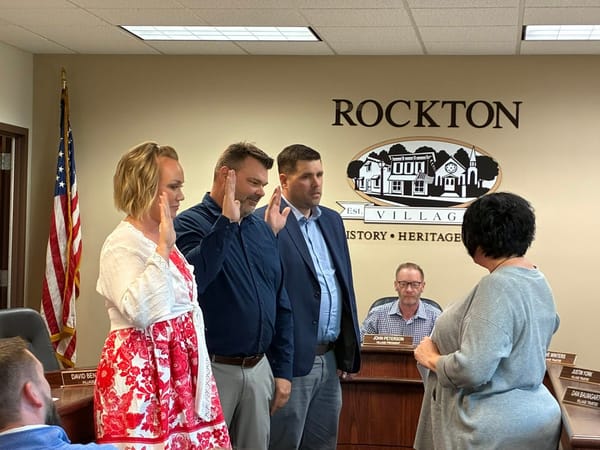Paul Arena opposes law requiring landlords to offer Section 8 housing
The bill still needs to be sent to the governor for his signature.

UPDATE: As amended, HB2775 doesn't require landlords to join the Section 8 program, but prohibits discrimination against tenants based on their source of income. The law took effect Jan. 1, 2023.
Landlords around Illinois have concerns about an amendment to the Homelessness Prevention Act that has passed both chambers and could soon be headed to the governor.
Paul Arena of Roscoe, a member of the Winnebago County Board (R-7) and director of legislative affairs at the Illinois Rental Property Association, said if the measure, HB2775, is signed into law, landlords statewide may lose control over their own leases by being pressured into joining the Section 8 program. The bill also gives protections against discrimination based on source of income, which Arena says his organization has no problem with.
Currently in Illinois, landlords may voluntarily choose to participate in the Section 8 program, a federal rental assistance program for low income individuals where monthly rent is determined by income. The program is funded by the United States Department of Housing and Urban Development (HUD) but administered by Public Housing Agencies (PHAs) such as Northern Illinois Regional Affordable Community Housing (NI ReACH) or the Rockford Housing Authority.
Support your local news!
“Section 8 is designed to be a voluntary program,” Arena said. “This bill requires that you sign a lease with the Housing Authority. That’s their lease and is non-negotiable and that lease has provisions in it that we oppose.”
“It's a blank check for government to further control rental property moving forward, and that is why it is so dangerous,” Arena said.
Access Living, an Illinois advocacy organization for the disabled, championed HB2775, saying, "In most of Illinois, property owners can turn down potential tenants because of the way they pay their rent – in other words, the source of their income. Landlords may not want to let you pay with cash, housing subsidies, Social Security or many other nontraditional sources of income."

Arena says his organization isn't against the source of income language of the bill, and many of their members do value and support the Section 8 program. Arena argued the bill would be perfectly acceptable if only it didn't force landlords to participate in what some see as a federal program in need of repairs.
A 2018 HUD study [PDF] reported, "Critics of the HCV [Housing Choice Voucher] program argue that there are good business reasons landlords do not participate; they include complaints about PHAs that have poor customer service or that increase the cost of renting to voucher holders by taking too long to complete housing quality standards inspections or by not sending rent checks on time." The report also suggested that some landlords aren't receiving the going market rate for their properties.
Just one sentence
“What we have said is that if they added one sentence to the bill that said ‘nothing here should be construed to require a property owner to sign a non-negotiable contract, addendum, or lease,'” Arena said. “Just that one sentence.”
In an April 4 letter to the editor, Arena wrote, "The United States Department of Housing and Urban Development (HUD) is working to fix the problems with the one-sided Section 8 program to make this voluntary program more attractive to Housing Providers. Instead of forcing it on Housing Providers, wait for the results."
The Northern Illinois Regional Affordable Community Housing (NI ReACH) administers housing and support for both Winnebago County Housing Authority (WCHA) and the Boone County Housing Authority (BCHA). Other agencies serve Rockford. Besides working with private landlords, NI ReACH manages apartments in Freeport, Rockford, South Beloit, and Rockton, including D’Agnolo Garden Apartments in Rockton, which it describes as "lovely 1-bedroom units on acres of park within a couple miles of banks, stores, restaurants and pharmacies."
Under the HB2775 measure, landlords could continue to screen tenants, even on the basis of income. However, if those tenants meet the landlord’s criteria, and the tenants use Section 8 subsidies, landlords would be required to sign Section 8 contracts, which would become part of the lease.
Section 8 rules and restrictions require landlords to provide "decent, safe, and sanitary housing to a tenant at a reasonable rent." But the rules also allow for mandatory, on-demand property inspections and government access to business records and to the computers where they are stored. If landlords don't feel comfortable with those rules and refuse to sign that contract, they could be charged with a human rights violation, just as if they had refused to rent to minorities.
Supporters and opponents
On the Illinois Rental Property Association's website, Arena urged landlords to oppose the bill, saying, "This bill will hurt the people who provide housing in your community and the members of the community that are seeking housing.... If Illinois is going to make welfare a Human Right, that right should not come at your expense. The proponents want to take your property rights so that others can benefit."
The bill’s sponsor, state Rep. LaShawn Ford, D-Chicago, said the law has been enacted in 19 other states with success.
“No one across the country that has this law has repealed it,” Ford said. “It is the right thing to do, and it was great negotiations because even the realtors decided to be in support.”
Anthony Hebron, VP of Marketing and Communications with Illinois Realtors, concurred, telling us that they are satisfied with the amendments they helped to add to the bill.
But Frank Bowman, Executive Director of the Illinois Manufactured Housing Association, told us, "IMHA believes the legislation, if signed into law by the Governor, will have the unintended consequence of further reducing the supply of affordable rental properties, hurting the very people the sponsors seek to assist. Given the choice of facing potential human rights violations in light of skyrocketing construction costs and property valuations, along with the present lack of housing options in much of Illinois, many rental housing providers may simply opt to sell a property rather than to continue renting it. Those citizens looking to become homeowners may benefit. Those looking for rentals will be at further disadvantage."
Kevin Bessler of The Center Square contributed to this story.





